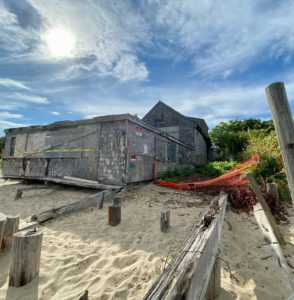PROVINCETOWN — The plan for a luxury harborfront development where the derelict Old Reliable Fish House unsteadily stands is finally poised to move beyond an appeal that’s tied it up in state Land Court for the last three years.
Negotiations with abutters have slowly advanced the plans of Christine Barker, developer of the ambitious project. At the same time, a recent state Supreme Judicial Court (SJC) decision affecting 17 towns’ harbor plans — including Provincetown’s — may present new legal obstacles.

Barker’s proposal calls for the demolition of the fish house structure at 227R Commercial St., which was condemned following a 2015 fire, and construction of a 31-room hotel, four residential condos, a restaurant and bar, a meeting space, and some parking, along with reconstruction of a 260-foot pier.
Two Steps Forward
The fish house property is owned by H. Bradford Rose. Barker has a purchase-and-sale agreement to buy it when she has all permits in place.
The project won enthusiastic support from the planning and zoning boards in early 2020 but was quickly appealed in state Land Court by three business owners with nearby properties.
Barker tried to satisfy their concerns — about scale and access — last year with a new plan that offered the same components as the original on a slightly smaller footprint. The changes were enough to persuade Rob Anderson, who owns the Canteen at 225 Commercial St., to drop out of the suit.
But Scott Ravelson, owner of 227-229 Commercial St., and Patrick Patrick, who owns Marine Specialties at 235 Commercial, continued with their court case.
The Old Reliable property lacks frontage on Commercial Street, and access is provided via a narrow easement that runs between Ravelson’s and Patrick’s properties. Ravelson argued that the easement wasn’t sufficient for a project the size of Barker’s.
Last month, Barker ended Ravelson’s opposition by purchasing his property, which is about a third of an acre, for $4.7 million. That’s double the town’s appraised value. Now Patrick is negotiating with Barker, and according to the latest joint status report filed at Land Court, the two sides are close to a settlement.
In a text message to the Independent on Monday, Barker was enthusiastic about the progress she has made. She plans to go forward with the plan that was approved in 2021. Barker didn’t say how her purchase of Ravelson’s property will affect the project.
“Analysis for the recently acquired property is underway,” she wrote, “and I hope to be before the boards with an exciting plan that complements the beachfront building sometime in the fall.”
But while the Land Court appeal may be soon settled, there has been another legal development that could affect Barker’s plan. It comes in the form of a recent state Supreme Judicial Court decision in a case called Armstrong v. Secretary of Energy and Environmental Affairs.
A Harbor Plan Hitch
The SJC ruled that state law doesn’t allow the Dept. of Environmental Protection (DEP) to delegate the review and approval of municipal harbor plans to the secretary of energy and environmental affairs — a task the secretary has handled since 1990.
The decision, that such plans must be handled by the DEP, invalidates the approvals of plans previously reviewed by the secretary.
Municipal harbor plans, which have been adopted by several coastal communities including Provincetown, offer some alternative standards, specific to their respective waterways, that deviate from the regulations in Chapter 91, the state’s Public Waterfront Act.
The recent SJC ruling was in a case involving the 2018 Boston Planning and Development Agency’s Municipal Harbor Plan for the Harbor Garage and Hook Wharf. But the judges’ decision invalidates all 17 municipal harbor plans approved over the last 30 years.
In Provincetown, Barker’s project’s harbor location, as well as its pier reconstruction element, require her to secure a Chapter 91 license from the DEP. Chapter 91 regulates both water-dependent uses, like piers, and other uses, including hotels. One purpose of the regulations is to maintain some waterfront benefit for the public.
In its 2018 municipal harbor plan revision, Provincetown included a couple of the amendments relating to Barker’s project as substitutions for requirements in Chapter 91.
One amendment would allow a building at 227R Commercial St. to extend slightly into the zone along the shore that is restricted to water-dependent uses. In Barker’s case, the water-dependent zone would be reconfigured to accommodate the building layout but would remain equal in square footage to what is required in state law.
A second amendment requests an alternative standard for a requirement for at least 40 percent exterior open space. Alternatives would include public amenities and programing on the pier that would make it a public destination.
Ginny Binder, vice chair of the Provincetown Harbor Committee, hopes for some resolution to the dilemma towns with municipal harbor plans now face because of the state Supreme Judicial Court ruling.
The town’s harbor plan is 140 pages long. “I don’t think they will want to throw the baby out with the bath water,” said Binder last week. “There will probably be some kind of review, but I can’t imagine they’ll make us start from scratch.”
In an email to the Independent, Barker’s attorney, Sarah Turano-Flores, said, “We are in the process of applying for Chapter 91 approval and are examining whether the decision in Armstrong will impact the project.”
The state is currently looking at “various options” to address the impact of the SJC ruling on the municipal harbor plans adopted by several coastal towns, Turano-Flores said. “For now, we are waiting to see how it will play out.”
The DEP is already in the process of drafting regulations to address the legal issue raised by the court.
Spokesperson Fabienne Alexis provided the following statement: “The Massachusetts Department of Environmental Protection remains committed to making any necessary changes to the municipal harbor plan approval process to continue a decades-long process of engaging in cooperative harbor planning.”



